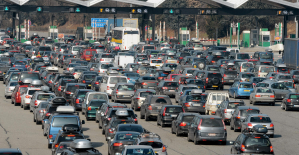At some point in the winter, large sections of the working middle class will be significantly relieved. Because when the 49-euro ticket, which is valid nationwide, comes, users of local public transport (ÖPNV) can save a lot: the new ticket is cheaper almost everywhere than the previous regular monthly tickets, and for somewhat longer commuter distances in commuter belts or metropolitan regions, the annual is Price advantage 1000 euros and more.
But for another large section of the population, the monthly tickets are not cheaper. These are people with discount entitlements: Hartz IV recipients and people with basic security, trainees and students as well as senior citizens. If there are reduced monthly tickets for them in their respective cities or regions - which is by no means the case everywhere - the prices have so far been well below 49 euros.
The range extends from 15 euros per month for a social ticket in the urban areas of Nuremberg and Fürth to 39.80 euros in large parts of North Rhine-Westphalia. There will be no relief there in connection with the 49-euro ticket in everyday life. For probably a long time.
Because there is no uniform and nationwide valid discount level for the new ticket. Before the federal and state governments agreed on the 49-euro ticket, there was a lot of discussion about a 29-euro ticket for those entitled to a discount, and Federal Transport Minister Volker Wissing (FDP) seemed to be in favor of it. But what he said about it immediately made it clear that his commitment was purely verbal: "As before, the federal states and municipalities have the opportunity to ensure participation with discounts," Wissing said in October - making it clear that the federal government there is no money for it.
This is also how the federal states interpret the 49-euro ticket decision of the Prime Ministers' Conference. As a WELT survey of the 16 transport ministries and senates showed, all ten countries that answered this question, which was difficult for them for cost reasons, signaled that nothing could be expected from the federal government. "Further tariff adjustments are at the expense of the federal states, the municipal authorities or the transport companies," replied the Saarland Ministry of Transport. "Currently it is assumed that there are no further nationwide reductions."
But that means that in this area there will not be what is considered a great advantage of the 49-euro ticket, namely a clearing of the public transport tariff jungle with its regional peculiarities. Instead, the reduction rules should remain a patchwork quilt.
Gas and electricity price brakes, Germany ticket, housing benefit reform and refugee issues: After the prime ministers' conference, there should actually be more clarity, but many are dissatisfied with the decisions.
Source: WORLD
In Saarland, for example, it is pointed out that there are reduced social tickets for 29 euros and 39 euros for larger areas of validity, as well as a semester ticket for students. Bremen mentions the previous reductions for the needy in the region in a similar way. Also from Brandenburg comes only the reference to "country-specific benefits". And they would have to be "financed solely by the respective countries".
The Ministry of Transport in Mecklenburg-Western Pomerania, where there are hardly any social tickets except in Rostock, refers to decisions that have already been made on a state-wide ticket for trainees and seniors, who have to pay 365 euros per year, i.e. 30 euros a month. But a reduction level that would be based on the 49-euro ticket is "not planned in Mecklenburg-Western Pomerania," said a spokesman.
Similarly, Bavaria is concentrating on the 365-euro tickets for students and trainees that are only valid in individual regions. There are no plans for a social ticket that would apply nationwide. In Bavaria, as in most other non-city states, concessions for Hartz IV recipients and other financially particularly needy people should continue to be left to the municipalities and only be valid there. Schleswig-Holstein and NRW, Saxony, Brandenburg and Saxony-Anhalt only announced that they were still checking everything.
It's a little more specific in Berlin. According to a decision by the red-green-red Senate, the regular monthly tickets will cost 29 euros and a discount level for the needy nine euros until the end of March, when the 49-euro ticket will probably start at the latest. The latter should probably last for a price that is still open - but only apply within Berlin.
But there is one exception: Thuringia. There is thinking beyond the federal state, in the direction of at least partially following a discount level on the 49-euro ticket. According to a spokeswoman for Erfurt's infrastructure ministry, the red-red-green state government is "giving initial consideration to introducing a cheap ticket for young people" and "thought" is about "paying a subsidy to the 'normal' nationwide ticket for the reduced price reach". The beneficiaries, the spokeswoman continued, would use "the same ticket as everyone else" and "would not have to accept any restrictions on validity".
That would mean: Young Thuringians could buy a 49-euro ticket with nationwide validity, but would have to pay less because of the state subsidy. How much exactly? “We are currently checking whether such a discounted ticket can be offered at a price of 28 euros. The state of Thuringia would probably have to raise funds of an additional 30 million euros for this.” This estimate gives an idea of how expensive it would be for the states if they adopted the subsidy model planned in Thuringia and applied it to all groups of needy people.
However, if the federal states are not prepared to do this, a paradoxical situation may arise for Hartz IV recipients: the 49-euro ticket would be reasonably interesting for them precisely where there is no social ticket so far. For example in Halle an der Saale. Because they have had to buy the mostly more expensive monthly tickets there up to now, they would at least have a certain saving compared to the new ticket and also the advantage of being valid for a trip to Magdeburg or Dresden.
But: With both the current Hartz IV rate and the planned citizen’s income, the amount theoretically provided for the entire mobility is less than 49 euros.
Those in need would have to save elsewhere if they wanted to buy it. That they can and want to do this is almost impossible in times of inflation.
"Kick-off Politics" is WELT's daily news podcast. The most important topic analyzed by WELT editors and the dates of the day. Subscribe to the podcast on Spotify, Apple Podcasts, Amazon Music or directly via RSS feed.

 New York: at Columbia University, the anti-Semitic drift of pro-Palestinian demonstrations
New York: at Columbia University, the anti-Semitic drift of pro-Palestinian demonstrations What is Akila, the mission in which the Charles de Gaulle is participating under NATO command?
What is Akila, the mission in which the Charles de Gaulle is participating under NATO command? Lawyer, banker, teacher: who are the 12 members of the jury in Donald Trump's trial?
Lawyer, banker, teacher: who are the 12 members of the jury in Donald Trump's trial? After 13 years of mission and seven successive leaders, the UN at an impasse in Libya
After 13 years of mission and seven successive leaders, the UN at an impasse in Libya What High Blood Pressure Does to Your Body (And Why It Should Be Treated)
What High Blood Pressure Does to Your Body (And Why It Should Be Treated) Vaccination in France has progressed in 2023, rejoices Public Health France
Vaccination in France has progressed in 2023, rejoices Public Health France Food additives suspected of promoting cardiovascular diseases
Food additives suspected of promoting cardiovascular diseases “Even morphine doesn’t work”: Léane, 17, victim of the adverse effects of an antibiotic
“Even morphine doesn’t work”: Léane, 17, victim of the adverse effects of an antibiotic Unemployment insurance: tightening of the rules on July 1
Unemployment insurance: tightening of the rules on July 1 Cancers, chronic diseases... Billions of workers hit by climate change, warns the UN
Cancers, chronic diseases... Billions of workers hit by climate change, warns the UN Closure of the A13 extended until at least mid-week
Closure of the A13 extended until at least mid-week Closure of the A13: Pécresse “asks the State to take charge of making the A14 free”
Closure of the A13: Pécresse “asks the State to take charge of making the A14 free” The series adaptation of One Hundred Years of Solitude promises to be faithful to the novel by Gabriel Garcia Marquez
The series adaptation of One Hundred Years of Solitude promises to be faithful to the novel by Gabriel Garcia Marquez Racism in France: comedian Ahmed Sylla apologizes for “having minimized this problem”
Racism in France: comedian Ahmed Sylla apologizes for “having minimized this problem” Mohammad Rasoulof and Michel Hazanavicius in competition at the Cannes Film Festival
Mohammad Rasoulof and Michel Hazanavicius in competition at the Cannes Film Festival UK lends Ghana treasures stolen during colonization
UK lends Ghana treasures stolen during colonization Skoda Kodiaq 2024: a 'beast' plug-in hybrid SUV
Skoda Kodiaq 2024: a 'beast' plug-in hybrid SUV Tesla launches a new Model Y with 600 km of autonomy at a "more accessible price"
Tesla launches a new Model Y with 600 km of autonomy at a "more accessible price" The 10 best-selling cars in March 2024 in Spain: sales fall due to Easter
The 10 best-selling cars in March 2024 in Spain: sales fall due to Easter A private jet company buys more than 100 flying cars
A private jet company buys more than 100 flying cars This is how housing prices have changed in Spain in the last decade
This is how housing prices have changed in Spain in the last decade The home mortgage firm drops 10% in January and interest soars to 3.46%
The home mortgage firm drops 10% in January and interest soars to 3.46% The jewel of the Rocío de Nagüeles urbanization: a dream villa in Marbella
The jewel of the Rocío de Nagüeles urbanization: a dream villa in Marbella Rental prices grow by 7.3% in February: where does it go up and where does it go down?
Rental prices grow by 7.3% in February: where does it go up and where does it go down? Europeans: “All those who claim that we don’t need Europe are liars”, criticizes Bayrou
Europeans: “All those who claim that we don’t need Europe are liars”, criticizes Bayrou With the promise of a “real burst of authority”, Gabriel Attal provokes the ire of the opposition
With the promise of a “real burst of authority”, Gabriel Attal provokes the ire of the opposition Europeans: the schedule of debates to follow between now and June 9
Europeans: the schedule of debates to follow between now and June 9 Europeans: “In France, there is a left and there is a right,” assures Bellamy
Europeans: “In France, there is a left and there is a right,” assures Bellamy These French cities that will boycott the World Cup in Qatar
These French cities that will boycott the World Cup in Qatar Basketball (F): big winner of Asvel, Basket Landes will face Tarbes in the semi-final of the League
Basketball (F): big winner of Asvel, Basket Landes will face Tarbes in the semi-final of the League Football: Yazici (Lille) “in shock” after an attempted theft at his home
Football: Yazici (Lille) “in shock” after an attempted theft at his home Serie A: victorious over AC Milan, Inter crowned Italian champions for the 20th time
Serie A: victorious over AC Milan, Inter crowned Italian champions for the 20th time Serie A: “Winning a title in a derby has never happened,” relishes Martinez after Inter’s coronation
Serie A: “Winning a title in a derby has never happened,” relishes Martinez after Inter’s coronation


















